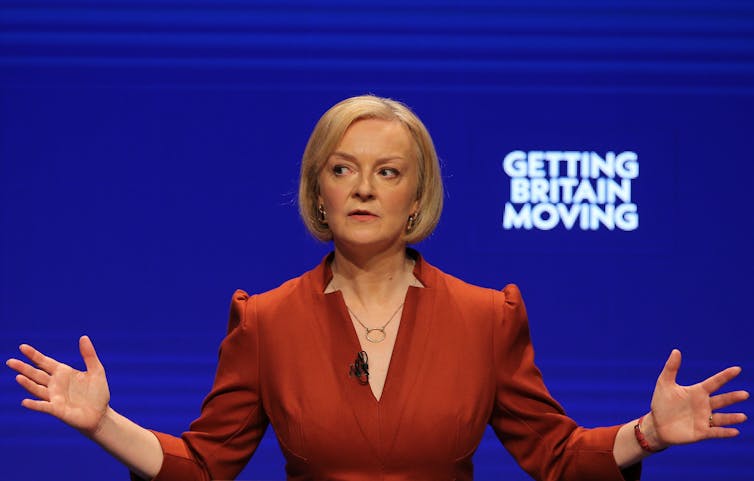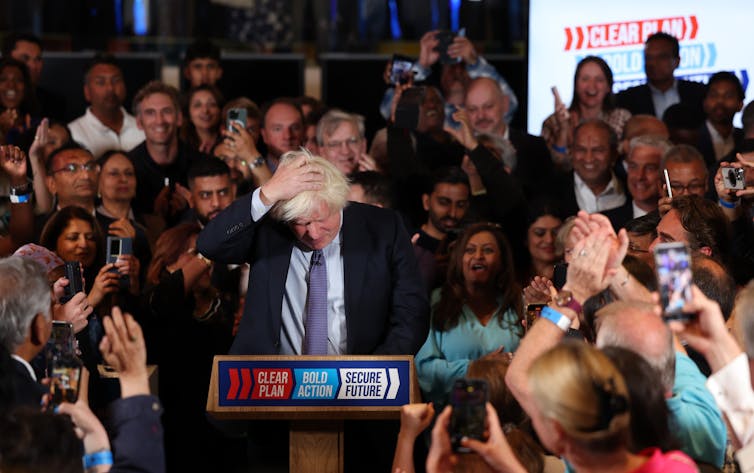Democracies are no better than other forms of government at avoiding catastrophic mistakes, but they are far more effective at rectifying them. While Britain’s 2024 general election might have seemed long overdue, as the country lurched from one failure to another, the scale of the Conservatives’ defeat is a testament to a democratic system’s ability to reject, reverse and renew.
It also poses a unique challenge to the new prime minister, Keir Starmer, who will be judged on his ability to restore probity to government and repair the damage done to the country.
It is easy to see this election in the tradition of other major defeats such as those of 1997, 1979 or 1964. A powerful slogan of “it is time for a change” was at stake and the ruling party seemed to have lost steam. It can even be interpreted as a strong message to Rishi Sunak’s Conservative Party that voters wanted to inflict punishment for incompetence, economic mismanagement and corruption.
But this is more than that.
The ruling party, which returned to elections in 2019 with an 80-seat majority, has been battered to death. A generation of politicians, long criticised for treating public life with contempt, has been ousted from office and parliament.
If we step back, we can see this election as a rectification of democracy’s series of glaring failures. Since the calamitous Brexit referendum eight years ago, Britain has suffered economic decline and a cost-of-living crisis (briefly exacerbated by Liz Truss and Kwasi Kwarteng’s disastrous so-called “mini-budget”).

The UK has endured a government with a long record of flouting the rules, reflected in the country’s fall to its lowest ever ranking on the Global Corruption Index. It has seen the awarding of dubious procurement contracts during the pandemic, the appointment of party donors to the House of Lords and a sustained attack on its constitution, institutions and the rule of law. Tiresome culture war crusades have divided communities and polluted public life.
There has been no comment on the denigration of public services, from education to the NHS and the armed forces, or on the housing, climate and inequality crises. The country’s international reputation has been damaged and relations with the UK’s closest allies in Europe have been strained.

Environmental Protection Agency/Andy Rain
What these mistakes have in common is that each of them stands firmly on the doorstep of 10 Downing Street and its four most recent inhabitants. This election puts a definitive end to all of them.
Parties can fall
For so long in opposition, and even during this campaign, Starmer’s party has danced to the populist tune of the government and its media cheerleaders. The challenge for his new administration, upon taking power, is to recognise that this election is a turning point, a rejection of this catalogue of errors and an expectation of political renewal.
The more existential question is whether this election is also a watershed moment that will forever change the shape of British politics. Could we be witnessing the demise of the Conservative Party and the end of its hegemonic position at the centre of public life?
It happened to the hitherto dominant Liberal Party a century ago, when it split in two and was replaced by a newly emerging Labour Party. A change of this nature is rare, of course, and requires some kind of major alteration.
In the years after the First World War, the rise of the Labour Party was fuelled by an expansion of the franchise so significant as to make the proposed votes for today’s 1.5 million 16- and 17-year-olds seem insignificant. Indeed, the Representation of the People Acts more than doubled the electorate by enfranchising women and the 40% of (working-class) men who were also disenfranchised.
Nothing quite as seismic is looming in Westminster today (although plans for automatic registration could add millions of voters), but comparisons should not be ruled out.
The post-Brexit realignment, realigned
Party identification among the electorate, which had been in decline since the 1960s, was turned upside down in 2019, when Boris Johnson’s Conservatives won a large number of seats in the red wall of the Midlands and the north of England. For the first time, Labour voters were richer than Conservatives. The Labour Party, of course, suffered its worst defeat since 1935. There was talk of a new political divide, in which class divisions had been replaced by Brexiteers and Remainers.

Want more election coverage from The Conversation’s academic experts? Over the coming weeks we’ll be bringing you informed analysis of developments in the campaign and fact-checking the claims being made.
Subscribe to our new weekly election newsletterdelivered every Friday during the campaign and afterwards.
The fact that all this has been overturned in the space of one parliament demonstrates the incredible fluidity of the current electorate. The fact that the number of Liberal Democrat MPs has more than tripled on a similar vote share shows the determination of the electorate to vote tactically to oust the Conservatives despite an electoral system that has historically kept them in power.
And then there is Nigel Farage’s reformist party, which has proved the ultimate protest vote for disenchanted Tory voters, attracted by the open recognition that few, if any, seats could be won, but that the higher the number of votes, the harder the blow for the Tories.
In reality, millions more people voted for reform than was reflected in its seat distribution. While there are some senior Tories who would still welcome it, Farage perhaps overplayed his hand during the campaign by putting the Tories on the defensive of a rival bent on destroying him. Time will tell whether the Tories can withstand the onslaught, but for now the right-wing psychodrama will be a political sideshow to the main event: a naïve new government and a revamped parliament.
Britain’s parliamentary democracy facilitated this catalogue of errors that have proved so damaging to the country in recent years, but in this election it has also proved highly effective in beginning the work of rectification. If Starmer has a moment to catch his breath, he might reflect on this as the main reason he has been given such a decisive majority.


